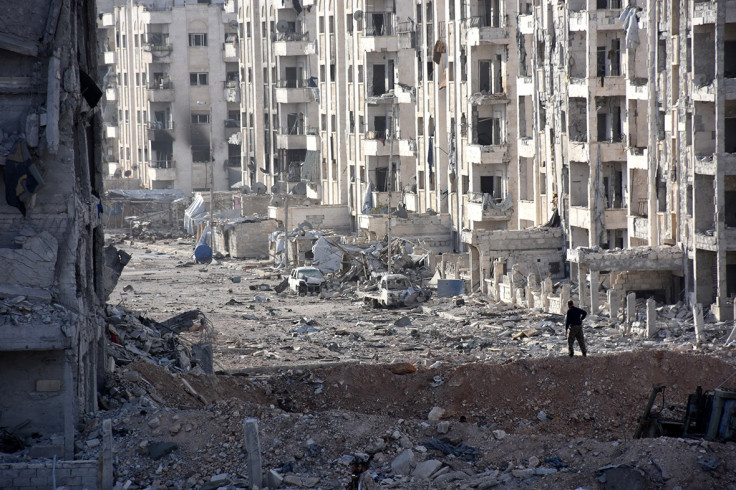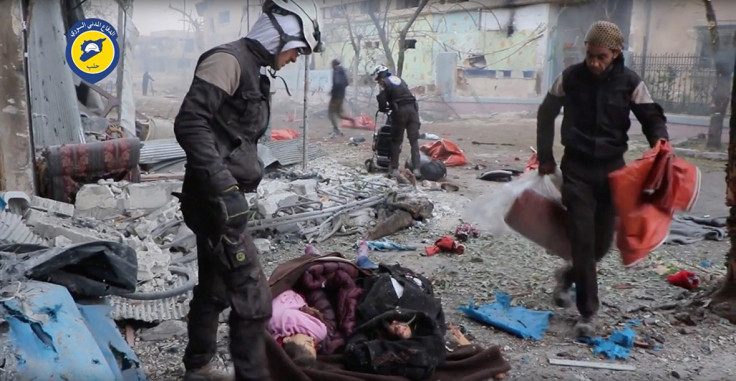We are no better than Nazi appeasers if we ignore Bashar al-Assad's genocide in Aleppo
Syrians find themselves completely alone as the death squads backed by Russian bombs move in.

Two types of imperialism have led to what is now the triumph of genocidal counterrevolution in Aleppo. Firstly, you have the active imperialism of the Russian Federation and the Islamic Republic of Iran in the form of their massive intervention on behalf of the Assad regime. It is the Russian air force that is so brutally smashing the liberated areas of Syria, with Aleppo most viciously targeted, while before that Russia supplied the Assad regime with weaponry and diplomatic support.
On the ground, it is Shia sectarian fascist forces from Lebanon, Iraq and South Asia, led by Iran's Revolutionary Guards, that lead the brutal fight against free Syrians, while Iran has also provided billions of dollars worth of financial aid to keep Assad's rump state afloat.
This intervention has been decisive in terms of ensuring Assad's survival, but it was only made decisive by the second type of imperialism that has been such an important factor in the triumph of Assad. This type is indeed what the left would call "Western imperialism", but it has not occurred in the manner that they might expect or ever recognise.
The second type has been passive imperialism. In the wake of the active imperialism of the Iraq war, imperialism has been conceived of as only having an active capacity, but, in Syria, we've seen its other capacity, one defined by cold, amoral indifference and the abandonment of allies out of Realpolitik – one where only meaningless rhetoric is offered in the face of fascism consuming a civilisation. One where the bodies of innocents lying on the ground surrounded with that now familiar blood spatter are conceived as nothing more than squashed ants on Aleppo's dusty old streets.
Regardless of the narratives of particularly the hard-to-far left and right that would have us believe that too much Western intervention has led to the "chaos" in Syria, any honest appraisal of the facts would conclude that the very opposite is true. The genocidal war waged by the pro-Assad forces in Syria has been allowed to occur due to a poisonous mixture of the spirit that saw Western liberal democracies turn a blind eye as fascism consumed Spain, or as British appeasers who sat with Nazis in Munich as Czechoslovakia was carved up, or, more recently, in the spirit of the indifference towards the unprecedented genocide in Rwanda.
In 2012, when the Assad regime began to use its air force to bombard areas of Syria liberated by the Free Syrian Army (FSA), this was a very deliberate strategy to cleanse these areas of civilian life and never let life approach anything like normal in any area of Syria not controlled by his dynastic tyrannical rule. As the civilian deaths mounted to the tens of thousands and millions of Syrians were displaced leading to the current refugee crisis, the Syrian opposition looked to the forces, namely the US, that had called themselves "Friends of Syria" to impose a no-fly zone (NFZ) to stop what they said was rapidly becoming a genocide.
They looked towards Libya, whose revolutionaries had been saved from Gaddafi's air force by a Nato NFZ and allowed to swiftly overthrow his regime, and thought that the case for a NFZ in Syria was, if anything, much stronger than the action taken in Libya. That was taken to prevent more potential massacres and genocide, but such things were already unfolding in Syria on a far bigger scale.
Syrians in Aleppo and across the whole of liberated Syria find themselves completely alone as the death squads move in
But the US wasn't interested in a NFZ. While Turkey and the GCC supported one and France and the UK said they supported it depending on US involvement, the Obama administration was completely unwilling to commit its vast resources to implement it. Perhaps this reticence on the part of the West was due to the fact that Syria, unlike Libya, didn't have vast oil resources and extremely lucrative business interests with European countries.
Or perhaps it was a mixture of this and what the then defence secretary Leon Panetta who has now majorly changed his tune) openly said was the policy of the US to emphasise stability by not supporting rebel forces to the point they destroyed the Assad regime, but rather "maintain[ing] as much of the military and police as you can, along with the security forces". Even at this point, when Assad was murdering and displacing millions, the US was talking about the need to maintain "regional stability".
One supposed "red line" that Obama set for US intervention was the use of chemical weapons by the Assad regime. In August 2013, the regime flagrantly crossed this red line by murdering more than 1000 Syrians in rebel-held Ghouta with sarin gas. But this red line turned out to be little more than a red herring. Following Ghouta, the British government were ready to commit to strikes against Assad's war machine, but a motion put to parliament by the Prime Minister David Cameron to ensure UK participation in action against Assad was defeated when Labour voted against it.

The Obama administration took the defeat in Britain as the excuse it was looking for to delay potential action, long enough for Russia to come up with a deal that would avert such action. The US readily accepted what would become known as the Kerry-Lavrov deal, whereby Assad would be able to continue his genocidal war against free Syrians by conventional means if he agreed to get rid of his chemical weapons.
While the appeasers and barrel bomb pacifists in the West rejoiced at the fact that military action had been averted, Assad was given an international green light to carry on his genocide with conventional weapons, while his imperialist backers saw that the West was not serious about backing the rebels.
Perhaps the most decisive nail in the coffin of the Syrian revolution came in 2015, when the rebels managed to liberate the city of Idlib and advance towards the regime heartlands of Latakia and Tartus. Given the rebels were fighting as the armed wing of a popular revolution, they had managed to overcome the largely foreign militias fighting for Assad. It was here that Iran appealed directly to Moscow, warning President Putin that if Russia didn't intervene now, Assad would fall.
Then came Russia's decisive and brutal intervention, ensuring the survival of Assad in military terms against the rebellion, as well as a ramping up of the genocide – the mass displacement and slaughter. But it still wasn't too late – the US, with the world's largest air force, as well as the backing of Nato and regional actors, could've still intervened and implemented no-bombing zones or threatened to attack regime targets. This would've at the very least given the rebels leverage in a peace process and halted the brutality.
Aleppo finds itself enveloped by fascism because the world is passively allowing it to happen.
Instead, the US, now completely focused on the fighting the Islamic State (Isis/Daesh), whose rise has been largely beneficial to Assad and which could've been averted had the US backed the rebels in its offensive against them in 2014, threw its weight behind the Russian-supported peace process designed to secure Assad's survival and isolate the rebels. We actually see in Aleppo the US's main anti-IS ally on the ground the Kurdish YPG fighting alongside Iran's fascist militias as they move to snuff out liberty in Aleppo.
The US conceived from the beginning that the destruction of Assad's regime would be detrimental to "regional stability", but with the rise of IS they acquiesced to the absurd idea that Assad remaining in place was preferable to his overthrow. The symbiotic relationship between Assad and IS was completely ignored in favour of delusory easy solutions. Those rebels that Obama had sneeringly called "farmers and pharmacists" were completely forsaken, as were millions of lives. The politics of raw power prevailed.
This is why Syrians in Aleppo and across the whole of liberated Syria find themselves completely alone as the death squads move in under the cover of unprecedented terror from the sky. While Western media continues to call rebels "Western-backed", the sordid truth is that they have no meaningful backers, which is why they have come undone by the sheer brutal power of Assad's imperialist backers. Even truly popular revolutions can't withstand thousands of bombs and clouds of death gas – Aleppo finds itself enveloped by fascism because the world is passively allowing it to happen.
With the rise of populist fascist forces across the West, exploiting the refugee crisis for their own gains and often directly supported by or supportive of Russian imperialism, it's with no comfort that one reflects that this imperialistic self-interest of the West that has paved the way for genocide in Syria will be akin to a serpent consuming itself. The White House itself is soon to be inhabited by a president who actively supports Russia's role in the smashing of the Syrian revolution.
The triumph of fascism in Aleppo will not be confined to that ancient city.
Sam Hamad is a Scottish-Egyptian writer based in Edinburgh. He specialises in Middle Eastern affairs.
© Copyright IBTimes 2025. All rights reserved.






















